Organisational Efficiency and Effectiveness: The Role of HRM
VerifiedAdded on 2020/03/16
|8
|2613
|44
Essay
AI Summary
This essay delves into the pivotal role of Human Resource Management (HRM) in fostering organizational efficiency and effectiveness. It examines HRM as a cross-functional process that aligns human resource activities with corporate goals, influencing productivity and investment opportunities. The essay analyzes various HRM theories, emphasizing the importance of skilled and inspired employees. It explores how HRM strategies, including information systems, job analysis, recruitment, and industrial relations, contribute to achieving efficiency and effectiveness. The paper highlights the significance of attracting and retaining talented employees through compensation, performance policies, and training programs. It also discusses the impact of organizational culture and employee behavior on overall performance. The conclusion emphasizes HRM's strategic role in formulating policies that drive organizational growth and success, ultimately enhancing the profit-earning ability of an enterprise.
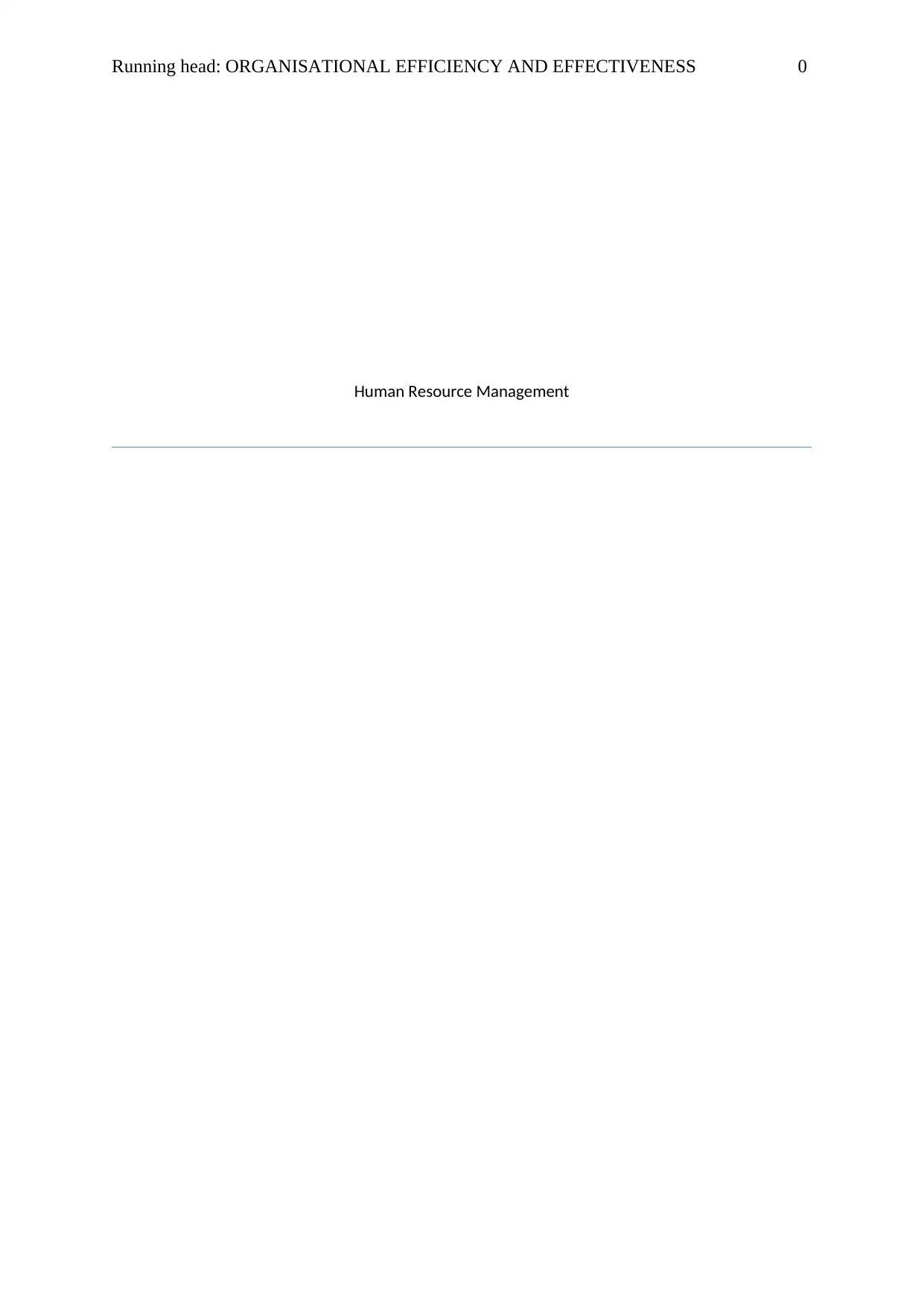
Running head: ORGANISATIONAL EFFICIENCY AND EFFECTIVENESS 0
Human Resource Management
Human Resource Management
Paraphrase This Document
Need a fresh take? Get an instant paraphrase of this document with our AI Paraphraser
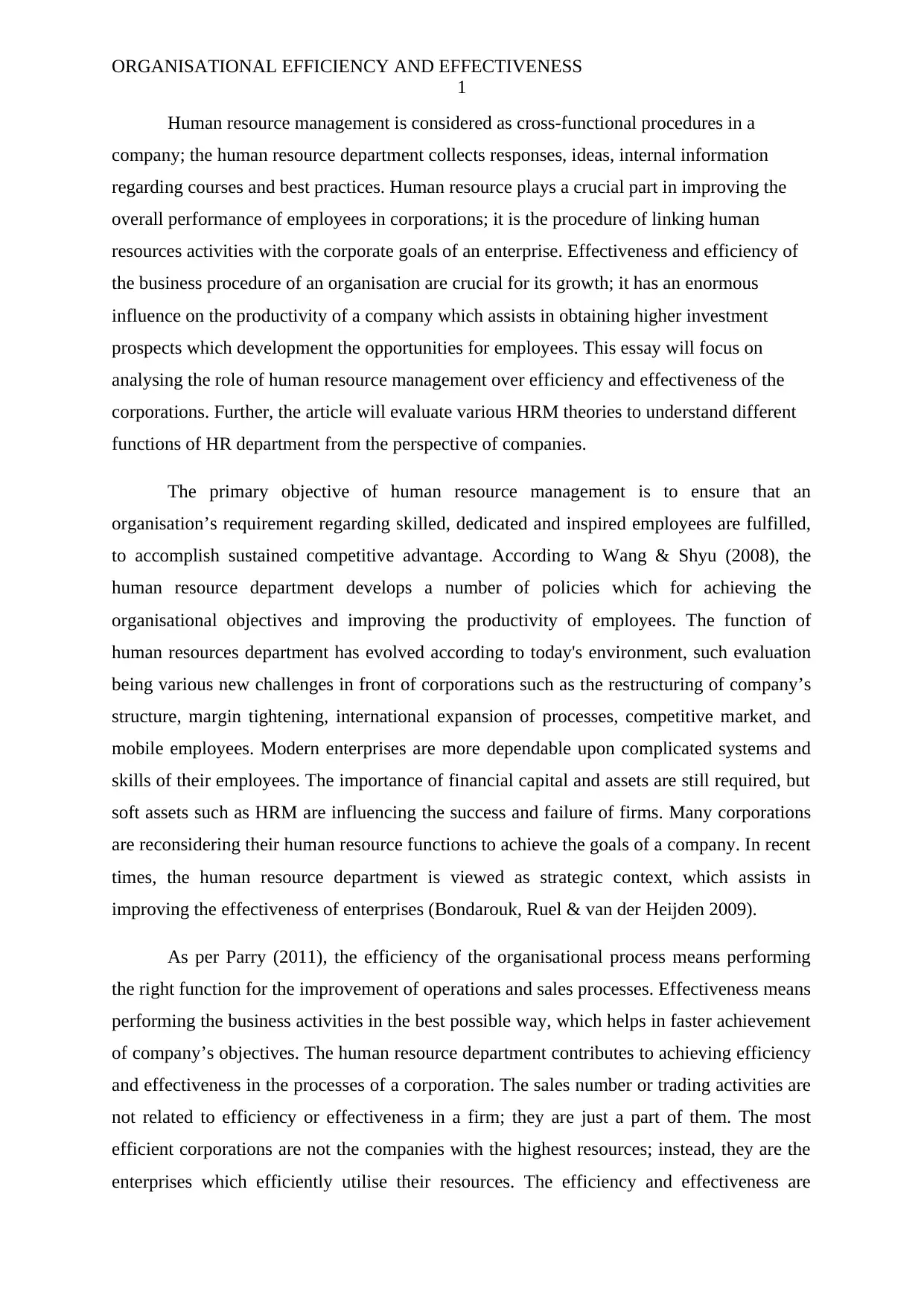
ORGANISATIONAL EFFICIENCY AND EFFECTIVENESS
1
Human resource management is considered as cross-functional procedures in a
company; the human resource department collects responses, ideas, internal information
regarding courses and best practices. Human resource plays a crucial part in improving the
overall performance of employees in corporations; it is the procedure of linking human
resources activities with the corporate goals of an enterprise. Effectiveness and efficiency of
the business procedure of an organisation are crucial for its growth; it has an enormous
influence on the productivity of a company which assists in obtaining higher investment
prospects which development the opportunities for employees. This essay will focus on
analysing the role of human resource management over efficiency and effectiveness of the
corporations. Further, the article will evaluate various HRM theories to understand different
functions of HR department from the perspective of companies.
The primary objective of human resource management is to ensure that an
organisation’s requirement regarding skilled, dedicated and inspired employees are fulfilled,
to accomplish sustained competitive advantage. According to Wang & Shyu (2008), the
human resource department develops a number of policies which for achieving the
organisational objectives and improving the productivity of employees. The function of
human resources department has evolved according to today's environment, such evaluation
being various new challenges in front of corporations such as the restructuring of company’s
structure, margin tightening, international expansion of processes, competitive market, and
mobile employees. Modern enterprises are more dependable upon complicated systems and
skills of their employees. The importance of financial capital and assets are still required, but
soft assets such as HRM are influencing the success and failure of firms. Many corporations
are reconsidering their human resource functions to achieve the goals of a company. In recent
times, the human resource department is viewed as strategic context, which assists in
improving the effectiveness of enterprises (Bondarouk, Ruel & van der Heijden 2009).
As per Parry (2011), the efficiency of the organisational process means performing
the right function for the improvement of operations and sales processes. Effectiveness means
performing the business activities in the best possible way, which helps in faster achievement
of company’s objectives. The human resource department contributes to achieving efficiency
and effectiveness in the processes of a corporation. The sales number or trading activities are
not related to efficiency or effectiveness in a firm; they are just a part of them. The most
efficient corporations are not the companies with the highest resources; instead, they are the
enterprises which efficiently utilise their resources. The efficiency and effectiveness are
1
Human resource management is considered as cross-functional procedures in a
company; the human resource department collects responses, ideas, internal information
regarding courses and best practices. Human resource plays a crucial part in improving the
overall performance of employees in corporations; it is the procedure of linking human
resources activities with the corporate goals of an enterprise. Effectiveness and efficiency of
the business procedure of an organisation are crucial for its growth; it has an enormous
influence on the productivity of a company which assists in obtaining higher investment
prospects which development the opportunities for employees. This essay will focus on
analysing the role of human resource management over efficiency and effectiveness of the
corporations. Further, the article will evaluate various HRM theories to understand different
functions of HR department from the perspective of companies.
The primary objective of human resource management is to ensure that an
organisation’s requirement regarding skilled, dedicated and inspired employees are fulfilled,
to accomplish sustained competitive advantage. According to Wang & Shyu (2008), the
human resource department develops a number of policies which for achieving the
organisational objectives and improving the productivity of employees. The function of
human resources department has evolved according to today's environment, such evaluation
being various new challenges in front of corporations such as the restructuring of company’s
structure, margin tightening, international expansion of processes, competitive market, and
mobile employees. Modern enterprises are more dependable upon complicated systems and
skills of their employees. The importance of financial capital and assets are still required, but
soft assets such as HRM are influencing the success and failure of firms. Many corporations
are reconsidering their human resource functions to achieve the goals of a company. In recent
times, the human resource department is viewed as strategic context, which assists in
improving the effectiveness of enterprises (Bondarouk, Ruel & van der Heijden 2009).
As per Parry (2011), the efficiency of the organisational process means performing
the right function for the improvement of operations and sales processes. Effectiveness means
performing the business activities in the best possible way, which helps in faster achievement
of company’s objectives. The human resource department contributes to achieving efficiency
and effectiveness in the processes of a corporation. The sales number or trading activities are
not related to efficiency or effectiveness in a firm; they are just a part of them. The most
efficient corporations are not the companies with the highest resources; instead, they are the
enterprises which efficiently utilise their resources. The efficiency and effectiveness are
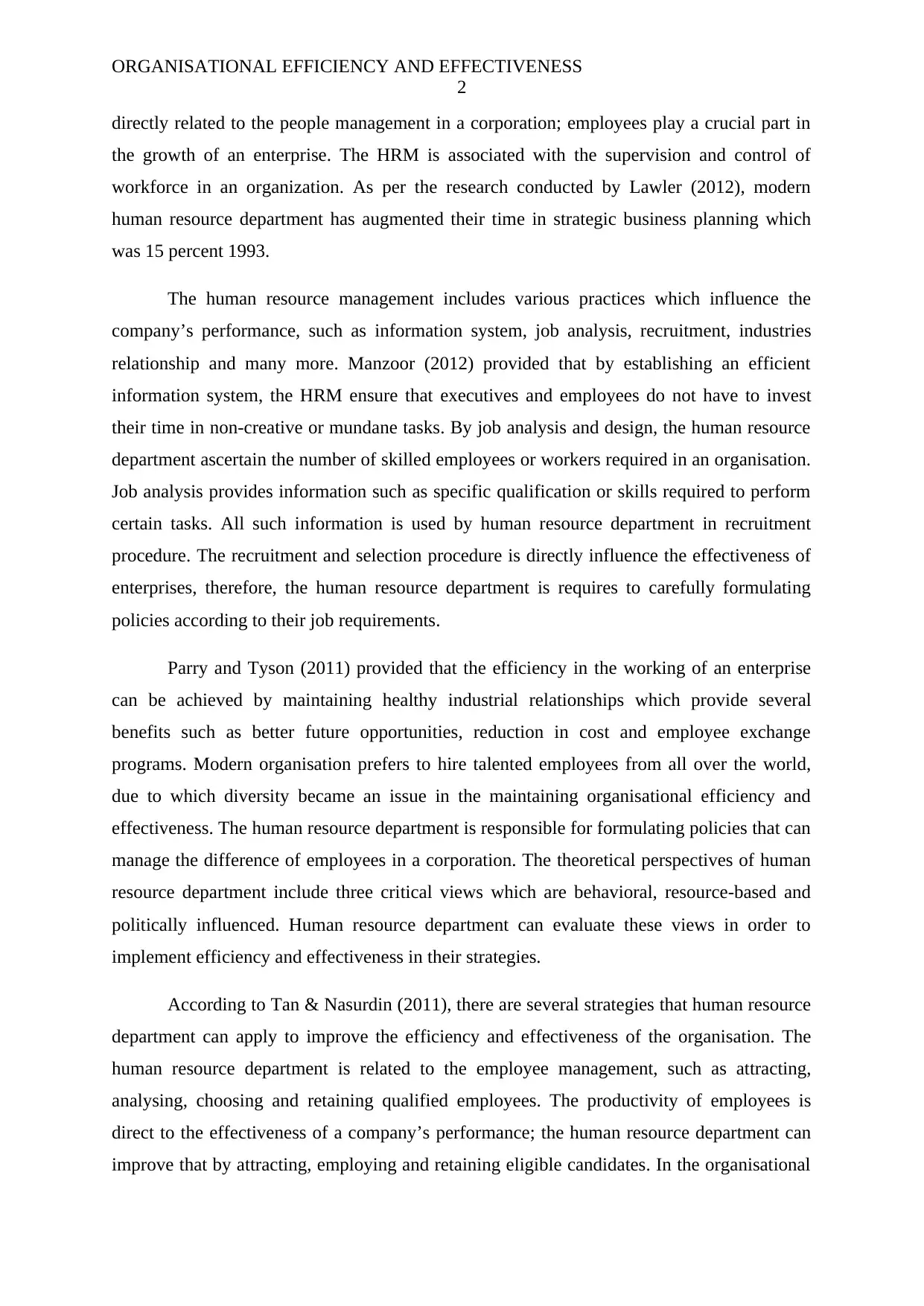
ORGANISATIONAL EFFICIENCY AND EFFECTIVENESS
2
directly related to the people management in a corporation; employees play a crucial part in
the growth of an enterprise. The HRM is associated with the supervision and control of
workforce in an organization. As per the research conducted by Lawler (2012), modern
human resource department has augmented their time in strategic business planning which
was 15 percent 1993.
The human resource management includes various practices which influence the
company’s performance, such as information system, job analysis, recruitment, industries
relationship and many more. Manzoor (2012) provided that by establishing an efficient
information system, the HRM ensure that executives and employees do not have to invest
their time in non-creative or mundane tasks. By job analysis and design, the human resource
department ascertain the number of skilled employees or workers required in an organisation.
Job analysis provides information such as specific qualification or skills required to perform
certain tasks. All such information is used by human resource department in recruitment
procedure. The recruitment and selection procedure is directly influence the effectiveness of
enterprises, therefore, the human resource department is requires to carefully formulating
policies according to their job requirements.
Parry and Tyson (2011) provided that the efficiency in the working of an enterprise
can be achieved by maintaining healthy industrial relationships which provide several
benefits such as better future opportunities, reduction in cost and employee exchange
programs. Modern organisation prefers to hire talented employees from all over the world,
due to which diversity became an issue in the maintaining organisational efficiency and
effectiveness. The human resource department is responsible for formulating policies that can
manage the difference of employees in a corporation. The theoretical perspectives of human
resource department include three critical views which are behavioral, resource-based and
politically influenced. Human resource department can evaluate these views in order to
implement efficiency and effectiveness in their strategies.
According to Tan & Nasurdin (2011), there are several strategies that human resource
department can apply to improve the efficiency and effectiveness of the organisation. The
human resource department is related to the employee management, such as attracting,
analysing, choosing and retaining qualified employees. The productivity of employees is
direct to the effectiveness of a company’s performance; the human resource department can
improve that by attracting, employing and retaining eligible candidates. In the organisational
2
directly related to the people management in a corporation; employees play a crucial part in
the growth of an enterprise. The HRM is associated with the supervision and control of
workforce in an organization. As per the research conducted by Lawler (2012), modern
human resource department has augmented their time in strategic business planning which
was 15 percent 1993.
The human resource management includes various practices which influence the
company’s performance, such as information system, job analysis, recruitment, industries
relationship and many more. Manzoor (2012) provided that by establishing an efficient
information system, the HRM ensure that executives and employees do not have to invest
their time in non-creative or mundane tasks. By job analysis and design, the human resource
department ascertain the number of skilled employees or workers required in an organisation.
Job analysis provides information such as specific qualification or skills required to perform
certain tasks. All such information is used by human resource department in recruitment
procedure. The recruitment and selection procedure is directly influence the effectiveness of
enterprises, therefore, the human resource department is requires to carefully formulating
policies according to their job requirements.
Parry and Tyson (2011) provided that the efficiency in the working of an enterprise
can be achieved by maintaining healthy industrial relationships which provide several
benefits such as better future opportunities, reduction in cost and employee exchange
programs. Modern organisation prefers to hire talented employees from all over the world,
due to which diversity became an issue in the maintaining organisational efficiency and
effectiveness. The human resource department is responsible for formulating policies that can
manage the difference of employees in a corporation. The theoretical perspectives of human
resource department include three critical views which are behavioral, resource-based and
politically influenced. Human resource department can evaluate these views in order to
implement efficiency and effectiveness in their strategies.
According to Tan & Nasurdin (2011), there are several strategies that human resource
department can apply to improve the efficiency and effectiveness of the organisation. The
human resource department is related to the employee management, such as attracting,
analysing, choosing and retaining qualified employees. The productivity of employees is
direct to the effectiveness of a company’s performance; the human resource department can
improve that by attracting, employing and retaining eligible candidates. In the organisational
⊘ This is a preview!⊘
Do you want full access?
Subscribe today to unlock all pages.

Trusted by 1+ million students worldwide
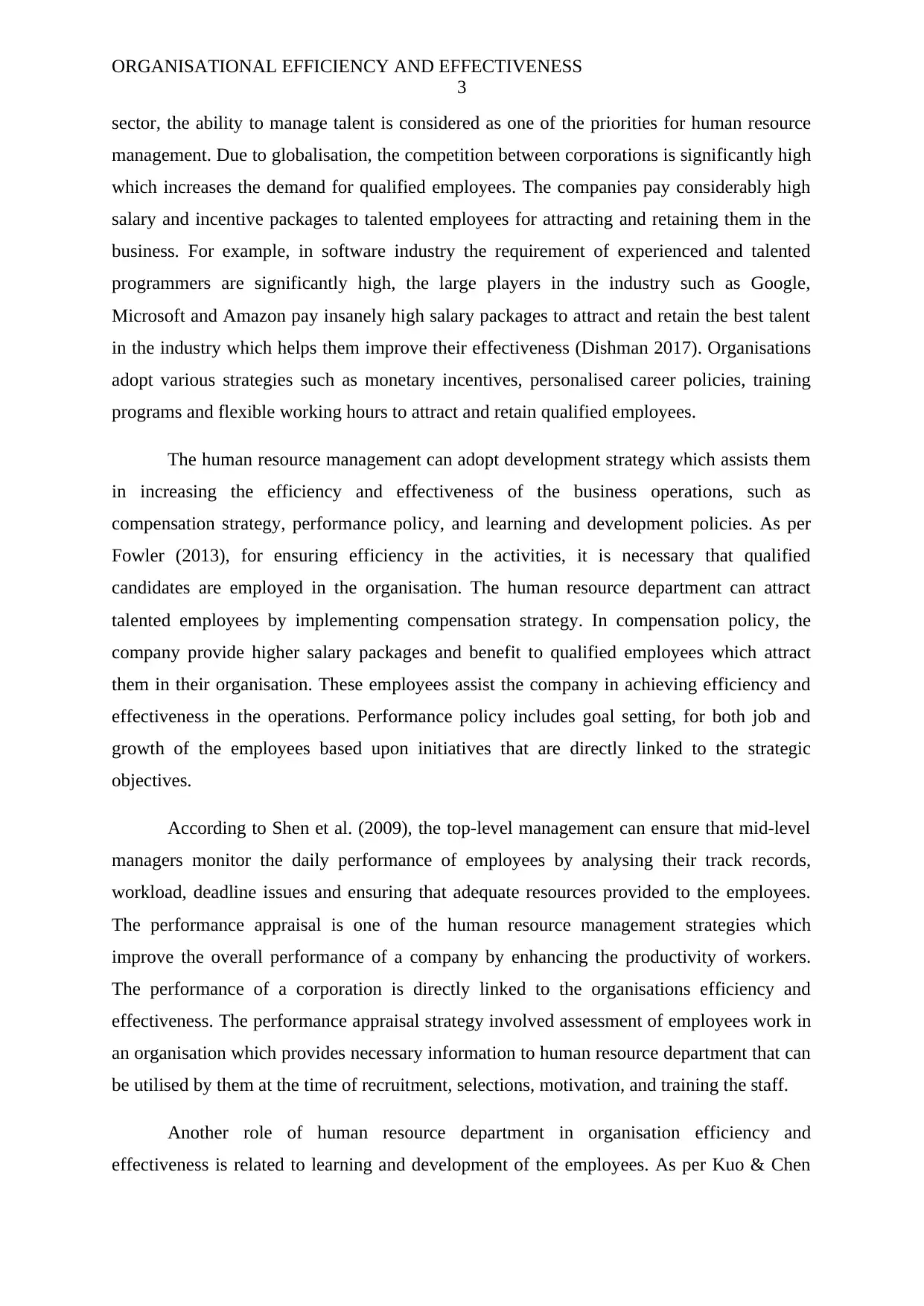
ORGANISATIONAL EFFICIENCY AND EFFECTIVENESS
3
sector, the ability to manage talent is considered as one of the priorities for human resource
management. Due to globalisation, the competition between corporations is significantly high
which increases the demand for qualified employees. The companies pay considerably high
salary and incentive packages to talented employees for attracting and retaining them in the
business. For example, in software industry the requirement of experienced and talented
programmers are significantly high, the large players in the industry such as Google,
Microsoft and Amazon pay insanely high salary packages to attract and retain the best talent
in the industry which helps them improve their effectiveness (Dishman 2017). Organisations
adopt various strategies such as monetary incentives, personalised career policies, training
programs and flexible working hours to attract and retain qualified employees.
The human resource management can adopt development strategy which assists them
in increasing the efficiency and effectiveness of the business operations, such as
compensation strategy, performance policy, and learning and development policies. As per
Fowler (2013), for ensuring efficiency in the activities, it is necessary that qualified
candidates are employed in the organisation. The human resource department can attract
talented employees by implementing compensation strategy. In compensation policy, the
company provide higher salary packages and benefit to qualified employees which attract
them in their organisation. These employees assist the company in achieving efficiency and
effectiveness in the operations. Performance policy includes goal setting, for both job and
growth of the employees based upon initiatives that are directly linked to the strategic
objectives.
According to Shen et al. (2009), the top-level management can ensure that mid-level
managers monitor the daily performance of employees by analysing their track records,
workload, deadline issues and ensuring that adequate resources provided to the employees.
The performance appraisal is one of the human resource management strategies which
improve the overall performance of a company by enhancing the productivity of workers.
The performance of a corporation is directly linked to the organisations efficiency and
effectiveness. The performance appraisal strategy involved assessment of employees work in
an organisation which provides necessary information to human resource department that can
be utilised by them at the time of recruitment, selections, motivation, and training the staff.
Another role of human resource department in organisation efficiency and
effectiveness is related to learning and development of the employees. As per Kuo & Chen
3
sector, the ability to manage talent is considered as one of the priorities for human resource
management. Due to globalisation, the competition between corporations is significantly high
which increases the demand for qualified employees. The companies pay considerably high
salary and incentive packages to talented employees for attracting and retaining them in the
business. For example, in software industry the requirement of experienced and talented
programmers are significantly high, the large players in the industry such as Google,
Microsoft and Amazon pay insanely high salary packages to attract and retain the best talent
in the industry which helps them improve their effectiveness (Dishman 2017). Organisations
adopt various strategies such as monetary incentives, personalised career policies, training
programs and flexible working hours to attract and retain qualified employees.
The human resource management can adopt development strategy which assists them
in increasing the efficiency and effectiveness of the business operations, such as
compensation strategy, performance policy, and learning and development policies. As per
Fowler (2013), for ensuring efficiency in the activities, it is necessary that qualified
candidates are employed in the organisation. The human resource department can attract
talented employees by implementing compensation strategy. In compensation policy, the
company provide higher salary packages and benefit to qualified employees which attract
them in their organisation. These employees assist the company in achieving efficiency and
effectiveness in the operations. Performance policy includes goal setting, for both job and
growth of the employees based upon initiatives that are directly linked to the strategic
objectives.
According to Shen et al. (2009), the top-level management can ensure that mid-level
managers monitor the daily performance of employees by analysing their track records,
workload, deadline issues and ensuring that adequate resources provided to the employees.
The performance appraisal is one of the human resource management strategies which
improve the overall performance of a company by enhancing the productivity of workers.
The performance of a corporation is directly linked to the organisations efficiency and
effectiveness. The performance appraisal strategy involved assessment of employees work in
an organisation which provides necessary information to human resource department that can
be utilised by them at the time of recruitment, selections, motivation, and training the staff.
Another role of human resource department in organisation efficiency and
effectiveness is related to learning and development of the employees. As per Kuo & Chen
Paraphrase This Document
Need a fresh take? Get an instant paraphrase of this document with our AI Paraphraser
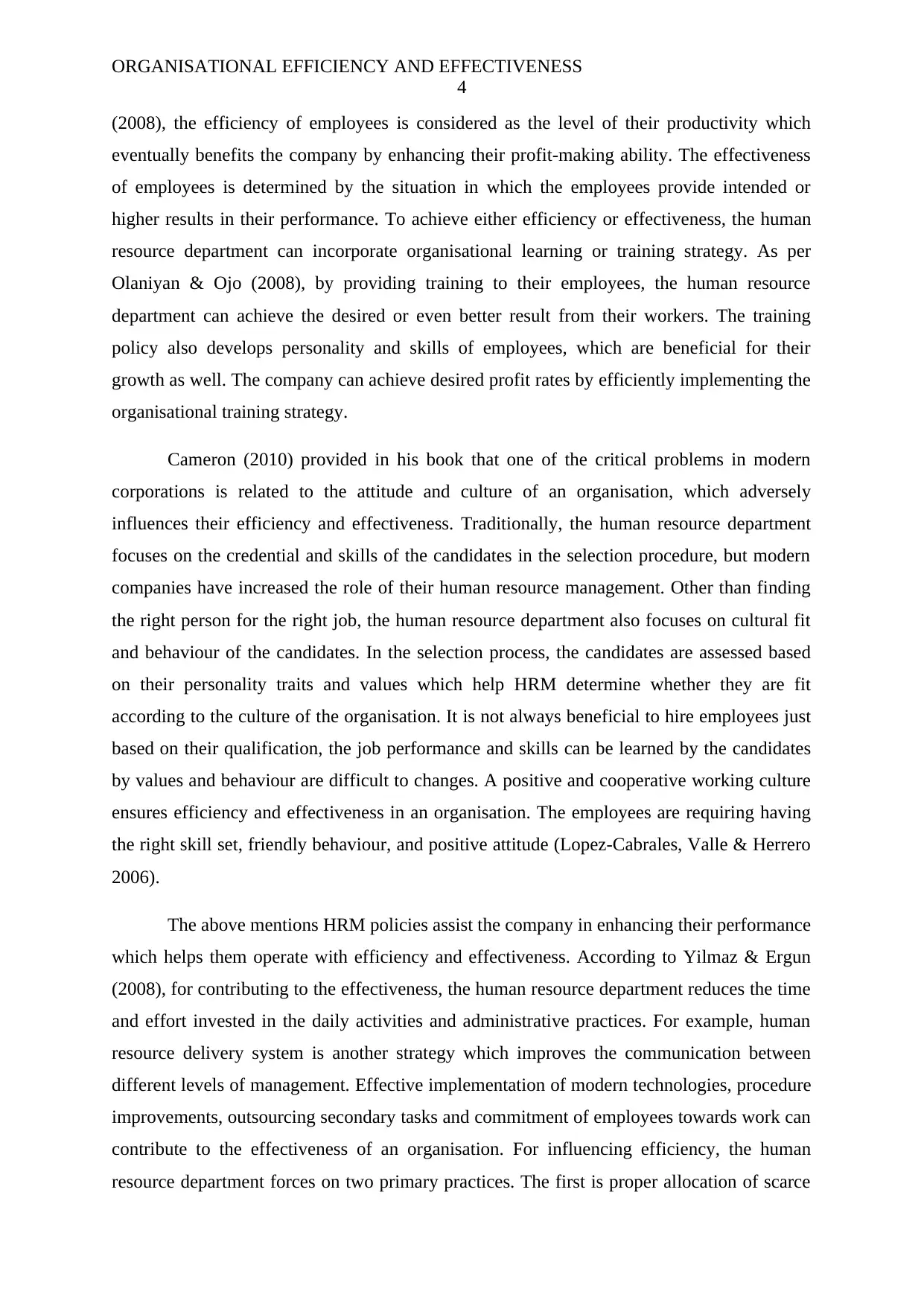
ORGANISATIONAL EFFICIENCY AND EFFECTIVENESS
4
(2008), the efficiency of employees is considered as the level of their productivity which
eventually benefits the company by enhancing their profit-making ability. The effectiveness
of employees is determined by the situation in which the employees provide intended or
higher results in their performance. To achieve either efficiency or effectiveness, the human
resource department can incorporate organisational learning or training strategy. As per
Olaniyan & Ojo (2008), by providing training to their employees, the human resource
department can achieve the desired or even better result from their workers. The training
policy also develops personality and skills of employees, which are beneficial for their
growth as well. The company can achieve desired profit rates by efficiently implementing the
organisational training strategy.
Cameron (2010) provided in his book that one of the critical problems in modern
corporations is related to the attitude and culture of an organisation, which adversely
influences their efficiency and effectiveness. Traditionally, the human resource department
focuses on the credential and skills of the candidates in the selection procedure, but modern
companies have increased the role of their human resource management. Other than finding
the right person for the right job, the human resource department also focuses on cultural fit
and behaviour of the candidates. In the selection process, the candidates are assessed based
on their personality traits and values which help HRM determine whether they are fit
according to the culture of the organisation. It is not always beneficial to hire employees just
based on their qualification, the job performance and skills can be learned by the candidates
by values and behaviour are difficult to changes. A positive and cooperative working culture
ensures efficiency and effectiveness in an organisation. The employees are requiring having
the right skill set, friendly behaviour, and positive attitude (Lopez-Cabrales, Valle & Herrero
2006).
The above mentions HRM policies assist the company in enhancing their performance
which helps them operate with efficiency and effectiveness. According to Yilmaz & Ergun
(2008), for contributing to the effectiveness, the human resource department reduces the time
and effort invested in the daily activities and administrative practices. For example, human
resource delivery system is another strategy which improves the communication between
different levels of management. Effective implementation of modern technologies, procedure
improvements, outsourcing secondary tasks and commitment of employees towards work can
contribute to the effectiveness of an organisation. For influencing efficiency, the human
resource department forces on two primary practices. The first is proper allocation of scarce
4
(2008), the efficiency of employees is considered as the level of their productivity which
eventually benefits the company by enhancing their profit-making ability. The effectiveness
of employees is determined by the situation in which the employees provide intended or
higher results in their performance. To achieve either efficiency or effectiveness, the human
resource department can incorporate organisational learning or training strategy. As per
Olaniyan & Ojo (2008), by providing training to their employees, the human resource
department can achieve the desired or even better result from their workers. The training
policy also develops personality and skills of employees, which are beneficial for their
growth as well. The company can achieve desired profit rates by efficiently implementing the
organisational training strategy.
Cameron (2010) provided in his book that one of the critical problems in modern
corporations is related to the attitude and culture of an organisation, which adversely
influences their efficiency and effectiveness. Traditionally, the human resource department
focuses on the credential and skills of the candidates in the selection procedure, but modern
companies have increased the role of their human resource management. Other than finding
the right person for the right job, the human resource department also focuses on cultural fit
and behaviour of the candidates. In the selection process, the candidates are assessed based
on their personality traits and values which help HRM determine whether they are fit
according to the culture of the organisation. It is not always beneficial to hire employees just
based on their qualification, the job performance and skills can be learned by the candidates
by values and behaviour are difficult to changes. A positive and cooperative working culture
ensures efficiency and effectiveness in an organisation. The employees are requiring having
the right skill set, friendly behaviour, and positive attitude (Lopez-Cabrales, Valle & Herrero
2006).
The above mentions HRM policies assist the company in enhancing their performance
which helps them operate with efficiency and effectiveness. According to Yilmaz & Ergun
(2008), for contributing to the effectiveness, the human resource department reduces the time
and effort invested in the daily activities and administrative practices. For example, human
resource delivery system is another strategy which improves the communication between
different levels of management. Effective implementation of modern technologies, procedure
improvements, outsourcing secondary tasks and commitment of employees towards work can
contribute to the effectiveness of an organisation. For influencing efficiency, the human
resource department forces on two primary practices. The first is proper allocation of scarce
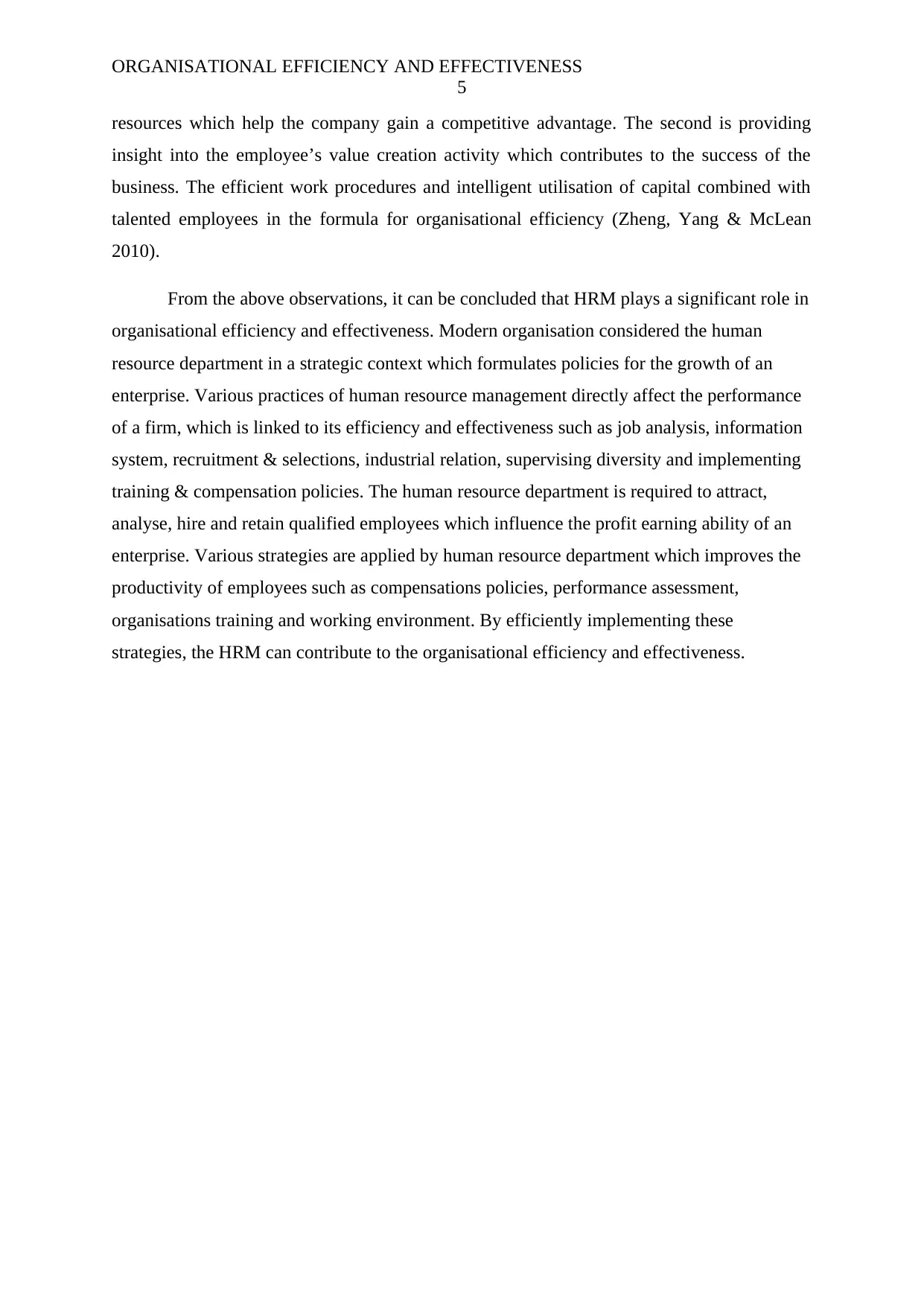
ORGANISATIONAL EFFICIENCY AND EFFECTIVENESS
5
resources which help the company gain a competitive advantage. The second is providing
insight into the employee’s value creation activity which contributes to the success of the
business. The efficient work procedures and intelligent utilisation of capital combined with
talented employees in the formula for organisational efficiency (Zheng, Yang & McLean
2010).
From the above observations, it can be concluded that HRM plays a significant role in
organisational efficiency and effectiveness. Modern organisation considered the human
resource department in a strategic context which formulates policies for the growth of an
enterprise. Various practices of human resource management directly affect the performance
of a firm, which is linked to its efficiency and effectiveness such as job analysis, information
system, recruitment & selections, industrial relation, supervising diversity and implementing
training & compensation policies. The human resource department is required to attract,
analyse, hire and retain qualified employees which influence the profit earning ability of an
enterprise. Various strategies are applied by human resource department which improves the
productivity of employees such as compensations policies, performance assessment,
organisations training and working environment. By efficiently implementing these
strategies, the HRM can contribute to the organisational efficiency and effectiveness.
5
resources which help the company gain a competitive advantage. The second is providing
insight into the employee’s value creation activity which contributes to the success of the
business. The efficient work procedures and intelligent utilisation of capital combined with
talented employees in the formula for organisational efficiency (Zheng, Yang & McLean
2010).
From the above observations, it can be concluded that HRM plays a significant role in
organisational efficiency and effectiveness. Modern organisation considered the human
resource department in a strategic context which formulates policies for the growth of an
enterprise. Various practices of human resource management directly affect the performance
of a firm, which is linked to its efficiency and effectiveness such as job analysis, information
system, recruitment & selections, industrial relation, supervising diversity and implementing
training & compensation policies. The human resource department is required to attract,
analyse, hire and retain qualified employees which influence the profit earning ability of an
enterprise. Various strategies are applied by human resource department which improves the
productivity of employees such as compensations policies, performance assessment,
organisations training and working environment. By efficiently implementing these
strategies, the HRM can contribute to the organisational efficiency and effectiveness.
⊘ This is a preview!⊘
Do you want full access?
Subscribe today to unlock all pages.

Trusted by 1+ million students worldwide
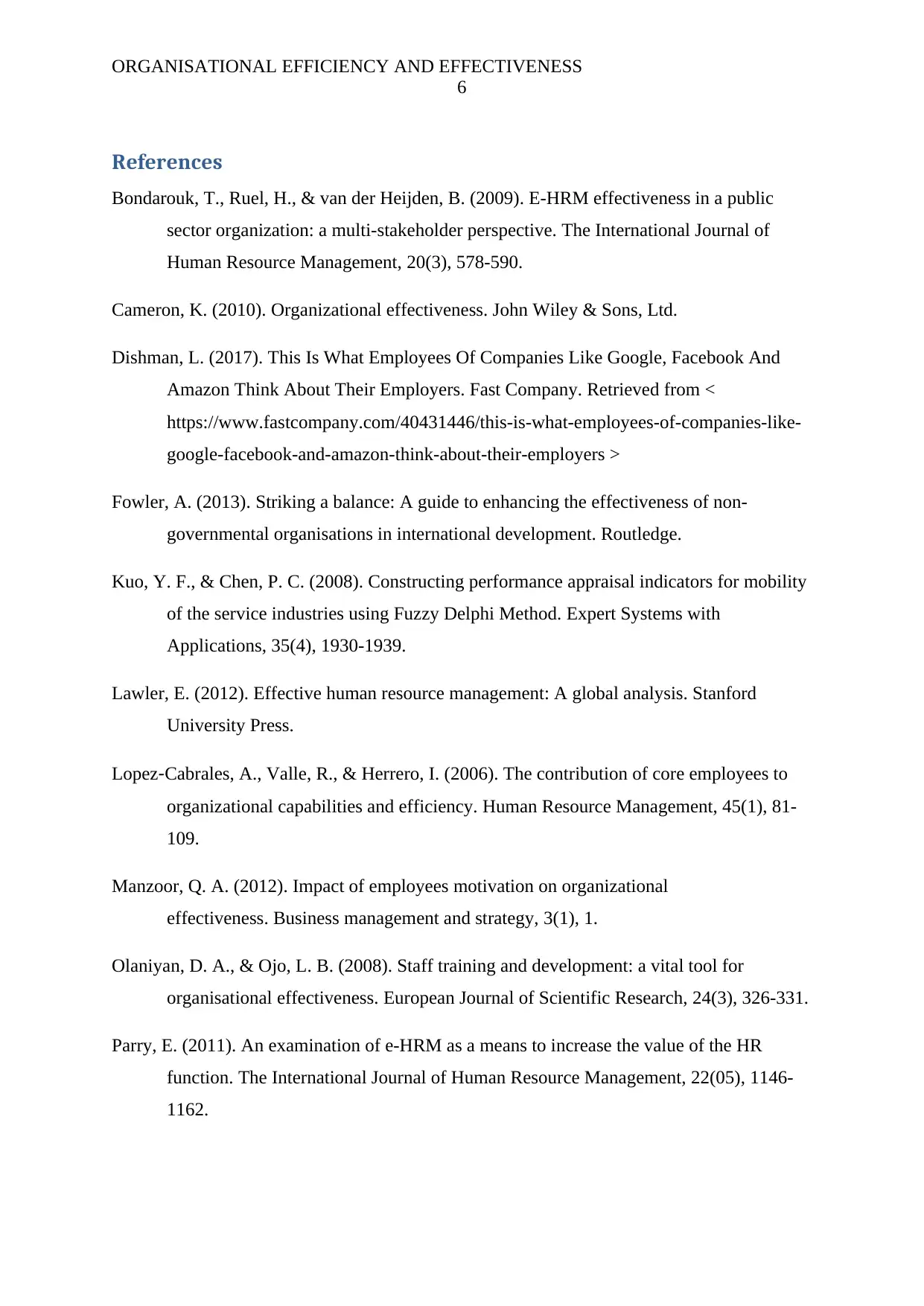
ORGANISATIONAL EFFICIENCY AND EFFECTIVENESS
6
References
Bondarouk, T., Ruel, H., & van der Heijden, B. (2009). E-HRM effectiveness in a public
sector organization: a multi-stakeholder perspective. The International Journal of
Human Resource Management, 20(3), 578-590.
Cameron, K. (2010). Organizational effectiveness. John Wiley & Sons, Ltd.
Dishman, L. (2017). This Is What Employees Of Companies Like Google, Facebook And
Amazon Think About Their Employers. Fast Company. Retrieved from <
https://www.fastcompany.com/40431446/this-is-what-employees-of-companies-like-
google-facebook-and-amazon-think-about-their-employers >
Fowler, A. (2013). Striking a balance: A guide to enhancing the effectiveness of non-
governmental organisations in international development. Routledge.
Kuo, Y. F., & Chen, P. C. (2008). Constructing performance appraisal indicators for mobility
of the service industries using Fuzzy Delphi Method. Expert Systems with
Applications, 35(4), 1930-1939.
Lawler, E. (2012). Effective human resource management: A global analysis. Stanford
University Press.
Lopez‐Cabrales, A., Valle, R., & Herrero, I. (2006). The contribution of core employees to
organizational capabilities and efficiency. Human Resource Management, 45(1), 81-
109.
Manzoor, Q. A. (2012). Impact of employees motivation on organizational
effectiveness. Business management and strategy, 3(1), 1.
Olaniyan, D. A., & Ojo, L. B. (2008). Staff training and development: a vital tool for
organisational effectiveness. European Journal of Scientific Research, 24(3), 326-331.
Parry, E. (2011). An examination of e-HRM as a means to increase the value of the HR
function. The International Journal of Human Resource Management, 22(05), 1146-
1162.
6
References
Bondarouk, T., Ruel, H., & van der Heijden, B. (2009). E-HRM effectiveness in a public
sector organization: a multi-stakeholder perspective. The International Journal of
Human Resource Management, 20(3), 578-590.
Cameron, K. (2010). Organizational effectiveness. John Wiley & Sons, Ltd.
Dishman, L. (2017). This Is What Employees Of Companies Like Google, Facebook And
Amazon Think About Their Employers. Fast Company. Retrieved from <
https://www.fastcompany.com/40431446/this-is-what-employees-of-companies-like-
google-facebook-and-amazon-think-about-their-employers >
Fowler, A. (2013). Striking a balance: A guide to enhancing the effectiveness of non-
governmental organisations in international development. Routledge.
Kuo, Y. F., & Chen, P. C. (2008). Constructing performance appraisal indicators for mobility
of the service industries using Fuzzy Delphi Method. Expert Systems with
Applications, 35(4), 1930-1939.
Lawler, E. (2012). Effective human resource management: A global analysis. Stanford
University Press.
Lopez‐Cabrales, A., Valle, R., & Herrero, I. (2006). The contribution of core employees to
organizational capabilities and efficiency. Human Resource Management, 45(1), 81-
109.
Manzoor, Q. A. (2012). Impact of employees motivation on organizational
effectiveness. Business management and strategy, 3(1), 1.
Olaniyan, D. A., & Ojo, L. B. (2008). Staff training and development: a vital tool for
organisational effectiveness. European Journal of Scientific Research, 24(3), 326-331.
Parry, E. (2011). An examination of e-HRM as a means to increase the value of the HR
function. The International Journal of Human Resource Management, 22(05), 1146-
1162.
Paraphrase This Document
Need a fresh take? Get an instant paraphrase of this document with our AI Paraphraser
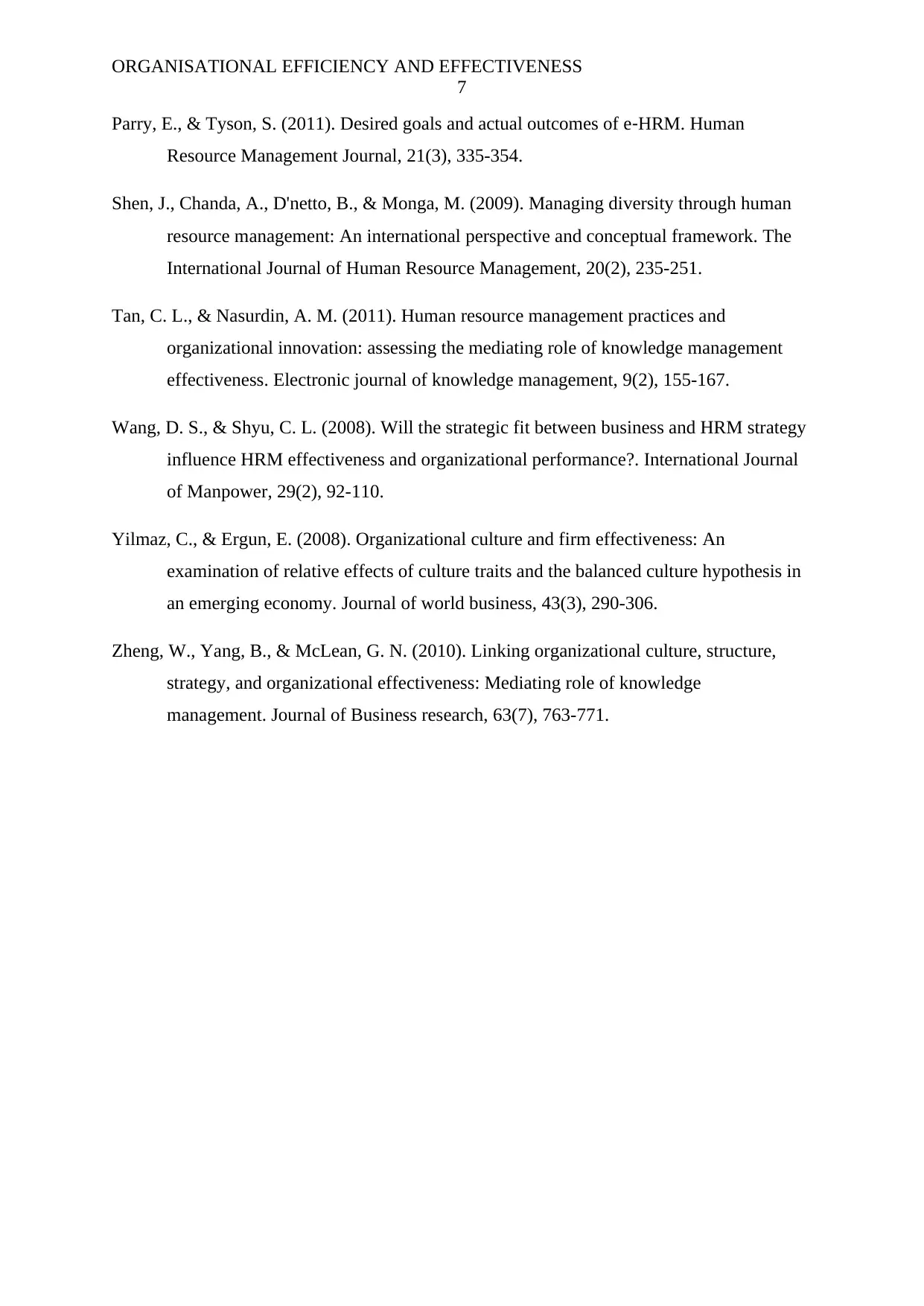
ORGANISATIONAL EFFICIENCY AND EFFECTIVENESS
7
Parry, E., & Tyson, S. (2011). Desired goals and actual outcomes of e‐HRM. Human
Resource Management Journal, 21(3), 335-354.
Shen, J., Chanda, A., D'netto, B., & Monga, M. (2009). Managing diversity through human
resource management: An international perspective and conceptual framework. The
International Journal of Human Resource Management, 20(2), 235-251.
Tan, C. L., & Nasurdin, A. M. (2011). Human resource management practices and
organizational innovation: assessing the mediating role of knowledge management
effectiveness. Electronic journal of knowledge management, 9(2), 155-167.
Wang, D. S., & Shyu, C. L. (2008). Will the strategic fit between business and HRM strategy
influence HRM effectiveness and organizational performance?. International Journal
of Manpower, 29(2), 92-110.
Yilmaz, C., & Ergun, E. (2008). Organizational culture and firm effectiveness: An
examination of relative effects of culture traits and the balanced culture hypothesis in
an emerging economy. Journal of world business, 43(3), 290-306.
Zheng, W., Yang, B., & McLean, G. N. (2010). Linking organizational culture, structure,
strategy, and organizational effectiveness: Mediating role of knowledge
management. Journal of Business research, 63(7), 763-771.
7
Parry, E., & Tyson, S. (2011). Desired goals and actual outcomes of e‐HRM. Human
Resource Management Journal, 21(3), 335-354.
Shen, J., Chanda, A., D'netto, B., & Monga, M. (2009). Managing diversity through human
resource management: An international perspective and conceptual framework. The
International Journal of Human Resource Management, 20(2), 235-251.
Tan, C. L., & Nasurdin, A. M. (2011). Human resource management practices and
organizational innovation: assessing the mediating role of knowledge management
effectiveness. Electronic journal of knowledge management, 9(2), 155-167.
Wang, D. S., & Shyu, C. L. (2008). Will the strategic fit between business and HRM strategy
influence HRM effectiveness and organizational performance?. International Journal
of Manpower, 29(2), 92-110.
Yilmaz, C., & Ergun, E. (2008). Organizational culture and firm effectiveness: An
examination of relative effects of culture traits and the balanced culture hypothesis in
an emerging economy. Journal of world business, 43(3), 290-306.
Zheng, W., Yang, B., & McLean, G. N. (2010). Linking organizational culture, structure,
strategy, and organizational effectiveness: Mediating role of knowledge
management. Journal of Business research, 63(7), 763-771.
1 out of 8
Related Documents
Your All-in-One AI-Powered Toolkit for Academic Success.
+13062052269
info@desklib.com
Available 24*7 on WhatsApp / Email
![[object Object]](/_next/static/media/star-bottom.7253800d.svg)
Unlock your academic potential
Copyright © 2020–2026 A2Z Services. All Rights Reserved. Developed and managed by ZUCOL.





